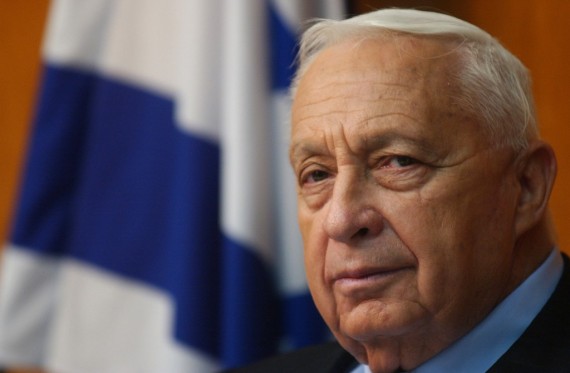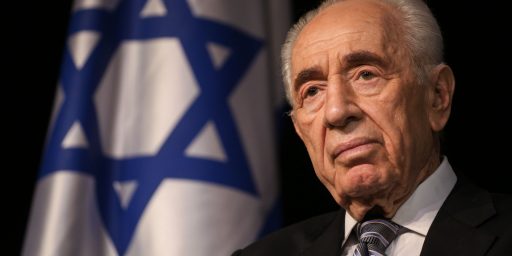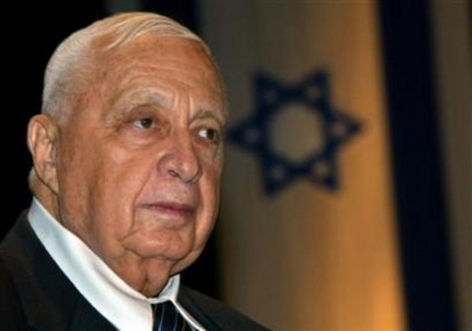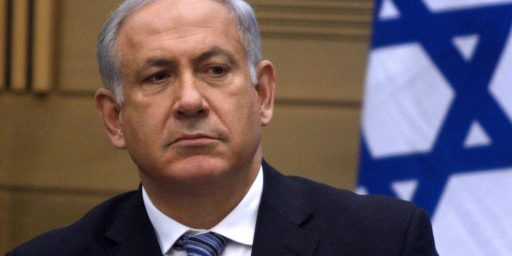Ariel Sharon, Israeli General, Defense Minister, Foreign Minister, Prime Minister, Dead At 85
After eight years in a coma, Ariel Sharon has passed away.
Ariel Sharon, who is among the last surviving members of the generation that served in Israel’s war for independence and went on to serve in every top position in the Israeli Government, has died at the age of 85 after spending eight years in a coma brought on by an apparent stroke in 2006:
Ariel Sharon, one of the most influential figures in Israel’s history, a military commander and political leader who at the height of his power redrew the country’s electoral map only to suffer a severe stroke from which he never recovered, died on Saturday in a hospital near Tel Aviv. He was 85.
President Shimon Peres of Israel confirmed the death in a statement on Saturday, saying that Mr. Sharon had “lost his final battle.”
A cunning and unforgiving general who went on to hold nearly every top government post, including prime minister at the time he was struck ill — Mr. Sharon spent his final years in what doctors defined as a state of minimal consciousness in a sterile suite at the hospital. Visits were restricted for fear of infection.
“It’s a tragedy,” Raanan Gissin, a close aide, said not long before Mr. Sharon died. “His legacy is dissipating away because people don’t know how to deal with this. They suppress it as if he’s not there.”
In many ways, Mr. Sharon’s story was that of his country’s. A champion of an iron-fisted, territory-expanding Zionism for most of his life, he stunned Israel and the world in 2005 with a Nixon-to-China reversal and withdrew all Israeli settlers and troops from Gaza. He then abandoned his Likud Party and formed a centrist movement called Kadima focused on further territorial withdrawal and a Palestinian state next door.
Mr. Sharon was incapacitated in January 2006, and in elections that followed, Kadima still won the most votes. His former deputy, Ehud Olmert, became prime minister. But the impact of Mr. Sharon’s political shift went beyond Kadima. The hawkish Likud Party, led by his rival Benjamin Netanyahu, was returned to power in 2009, and Mr. Netanyahu, too, said then that he favored a Palestinian state alongside Israel.
An architect of Israeli settlements in the occupied lands, Mr. Sharon gained infamy for his harsh tactics against the Palestinians over whom Israel ruled. That reputation began to soften after his election as prime minister in 2001, when he first talked about the inevitability of Palestinian statehood.
Israeli settlers, who had seen him as their patron, considered him an enemy after he won re-election in 2003. In addition to withdrawing from Gaza and a small portion of the West Bank, he completed part of a 450-mile barrier along and through parts of the West Bank — a barrier he had originally opposed. It not only reduced infiltration by militants into Israel but also provided the outline of a border with a future Palestinian state, albeit one he envisioned as having limited sovereignty.
It was as a member of the forces that fought for independence, and later the Israeli military, though, that Sharon first earned his reputation:
At the height of the independence war, in May 1948, Mr. Sharon’s unit was sent to take part in the battle of Latrun against the Jordanian Army, at the foot of the hilly entrance to Jerusalem. It was a disastrous battle for the Zionists, and Mr. Sharon was badly wounded in the abdomen. Despite initial rescue efforts, he lay abandoned and bleeding for hours, and nearly died. It was an early and influential encounter with what he considered incompetence above him.
(…)
When he was 20, Mr. Sharon married a young Romanian immigrant named Margalit Zimmerman, who had been his student in Gadna and who went by the nickname Gali. After the 1948 war, he remained in the army and served in a number of posts around the country. In 1952, he took a leave from the army, and the couple moved to Jerusalem, where Mr. Sharon began Middle Eastern studies at the Hebrew University and his wife became a psychiatric nurse.
In 1953, Mr. Sharon was asked to form and lead the first elite commando force for special operations behind enemy lines. It was named Unit 101, and although it operated as an independent unit for less than a year, it became legendary in Israel. The aim of the unit was to retaliate for cross-border raids, Arab violations of the 1949 armistice agreements and attacks against Israeli civilian targets.
The unit’s first major operation came in October 1953, after an Israeli woman and her two children were murdered while sleeping in their home in the town of Yehud. Mr. Sharon led a reprisal raid on the Jordanian town of Qibya, which was said to be harboring Palestinian guerrillas.
(…)
The battle of Qibya, in which 69 people were killed, more than half of them women and children, and 45 houses were demolished, brought Israel its first condemnation by the United Nations Security Council and became a Palestinian rallying cry for a generation.
A furor erupted in Israel over the civilian deaths, but the government did not to investigate and covered up for the commando unit by saying that no Israeli soldiers had been involved. The raid, Ben-Gurion said at the time, must have been by people around Jerusalem, “refugees from Arab countries and survivors of Nazi concentration camps, who had suffered terribly at the hands of their tormentors and had shown great restraint until now.”
Unit 101 cultivated a sense among its members of being above rules and able to operate under the most severe conditions, an attitude that later permeated all elite Israeli military units.
In the 1956 Sinai campaign, Mr. Sharon commanded a paratroop brigade and violated orders by driving his men deep into Sinai to the Mitla Pass, where they were ambushed by Egyptian forces and sustained dozens of deaths, with scores of soldiers wounded. He had been unaware of a deal among Britain, France and Israel regarding the Mitla Pass. He was not shy with his complaints or sense of betrayal, and when the war ended his career suffered.
(…)
In 1964, Mr. Sharon’s flagging military career was revived by Mr. Rabin, then the chief of staff, who made him chief of the northern command. When the 1967 war broke out in June, Mr. Sharon was sent south to his old command area and played a crucial role on the Egyptian front.
When the war ended in a stunning victory for Israel — which had tripled its land mass and defeated the combined armies of Jordan, Syria and Egypt — Mr. Sharon felt a euphoria nearly unmatched in his life, he wrote in his autobiography.
(…)
In 1973, Mr. Sharon felt drawn to politics. With help from American friends, he also bought a large farm in the Negev Desert — it remains the largest privately owned farm in the country — and talked about retirement from the military. But that October, a shocking invasion by Egypt and Syria, a war that Israel nearly lost, delayed his plans.
He pulled off his most extraordinary feat of combat when he waged a daring crossing of the Suez Canal behind Egyptian lines, a move often described as either brilliant or foolhardy, and a turning point in the war.
Mr. Sharon had been hit in the head by a shifting tank turret, and photographs of him with his head bandaged appeared in many newspapers and remain a symbol of that war. After that, Mr. Sharon did retire and helped engineer the birth of the Likud bloc, a political union between the Liberal Party and the more right-wing Herut Party of Menachem Begin.
It was as a politician, though, that Sharon would become most remembered around the world. Under Begin’s wing, he entered Parliament in the late 70s, and was elevated to Minister of Defense in the early 1980s, however it was there that he suffered his greatest set back when he became the mastermind behind Israel’s invasion of Lebanon, which was meant to wipe out the bases that the Palestine Liberation Organization was using to launch attacks into Israel. All the invasion seemed to do, though, was suck Israel into the brewing ethnic conflicts and quasi civil war that was gripping Israeli’s northern neighbor at the time. As the war dragged on, Sharon’s position became weaker and weaker, and ultimately fell apart when the decision was made to launch attacks against several Palestinian refugee camps, specifically including Sabra and Shatila, two camps in West Beirut. Those areas were attacked not by Israeli forces, but by Christian militia forces who had allied themselves with Israel and who went on to cause a massacre of Palestinian civilians that shocked the world, including much of the Israeli public. Sharon ended up having to resign as Defense Minister, although he continued to play a role in Israeli politics and even filed, and partly won, a libel suit against Time Magazine, related to their reporting on his role in the West Beirut massacre.
Within a decade, Sharon was back near the top of Israeli politics, where he played his larges role yet:
After Mr. Netanyahu defeated Mr. Peres in 1996 to become prime minister, Mr. Sharon joined Mr. Netanyahu at the Wye Plantation in Maryland to negotiate a continuation of the peace process with Mr. Arafat and the Palestinians.
But Mr. Sharon remained aloof from the talks, and pointedly refused to shake Mr. Arafat’s hand, as Mr. Rabin had done on the White House lawn in 1993. Mr. Sharon said that he had spent years trying to kill Mr. Arafat, and that he was not about to shake his hand.
Mr. Barak, of the Labor Party, defeated Mr. Netanyahu in 1999, but after the collapse of his peace talks with the Palestinians, Mr. Barak called for new elections for early 2001. It was widely expected that Mr. Netanyahu would run for the Likud Party. When he decided not to, Mr. Sharon, the stand-in party chief, became the unexpected candidate and surprise winner.
He brought Mr. Peres in as foreign minister, and the two septuagenarians, who as young men had sat at the elbows of Ben-Gurion when he ran the newly formed country, found themselves back together. Their partnership continued to thrive, and Mr. Peres left the Labor Party, which had been his political home his entire life, to join Mr. Sharon’s Kadima Party. Mr. Peres was later elected the country’s president.
Here, in part, is how The Jerusalem Post, remembers Sharon:
Sharon was one of Israel’s legendary politicians and military leaders. He played an instrumental role in IDF victories in the Sinai desert in both the 1967 Six Day War and in the 1973 Yom Kippur War. His victories on the battlefield, immortalized by the image of him in an IDF uniform with a white bandage wrapped around his wounded forehead, earned him the title, “Arik, King of Israel.”
He was equally fearless in the political arena, where he was the father of two parties, Likud and Kadima. As defense minister in 1982, he oversaw the Lebanon War before he was ousted from office in 1983 as a result of the Sabra and Shatilla massacre for which the Kahn Commission of Inquiry found him indirectly responsible.
But he returned to politics. As construction and housing minister from 1990 to 1992, he was responsible for a massive building effort of 144,000 apartments to house the flood of Russian-speaking immigrants from the former Soviet Union bloc. As the father of the settlement movement, he was also instrumental in building thousands of homes in Judea and Samaria and is famous for urging right-wing activists “to run for the hilltops.”
He rose to the post of foreign minister in 1998. In September 2000, as the head of the Likud party, his walk on the Temple Mount was cited by Palestinians as the trigger for the second intifada.
He was elected prime minister in 2001 and under his leadership Israel began to build its security barrier in the West Bank.
He was famous for the slogan “The fate of Netzarim [a Jewish settlement in the Gaza Strip] is the fate of Tel Aviv.” But as prime minister, he formulated and executed the disengagement, in which Israel evacuated 21 Gaza settlements along with another four in northern Samaria. In 2005, he left the Likud in anger, choosing to create Kadima with Shimon Peres, Ehud Olmert and Livni.
After his stroke, Kadima went on to win the 2006 election under Olmert’s leadership.
Say whatever whatever one might about his often controversial career, there is no doubt that Sharon was among the most important leaders in the history of one of the most important countries in the Middle East along with names such as Ben-Gurion, Meir, Begin, Rabin, and Peres. Additionally, not withstanding the image he had crafted as a warrior and a hardliner when it came to Israeli security, in the end he took significant steps toward advancing he peace process in ways that contemporary hardliners would likely find objectionable. Indeed, one wonders how he might handle issues of Iran and its nuclear program, and of course the peace process and settlements on the West Bank, compared to the manner in which current Prime Minister Benjamin Netenyahu is handling it. In any case, there are few people in the Middle East who made an impact on the region, for good or for ill, in the manner that he did.







Ariel Sharon has been dead for years and keeping him “alive” was cruel and a waste of resources. He is an example of why so called “death panels” are not necessarily a bad thing..
They should have harvested his organs and given them to needy Palestinians.
@Gustopher: Why bother? The Palestinians have shown, on several occasions, that they will gleefully “harvest” organs from Israelis. Occasionally, without the customary waiting for the “donors” to be dead.
So sad. Too many people concerned with keeping someone “alive” versus actually being able to live a life and pass naturally.
For what its worth, rest in peace, Mr. Sharon. All human beings deserve that.
@KM: After 8 years he finally can rest in peace.
rip, 8nyrs in a coma sucks- just ask obama, he’s got 3 more yrs to prove otherwise.
An ironic statement, considering how brain-dead it is…
Blessed are the peacemakers, for they will be called the children of God.
Matthew 5:9